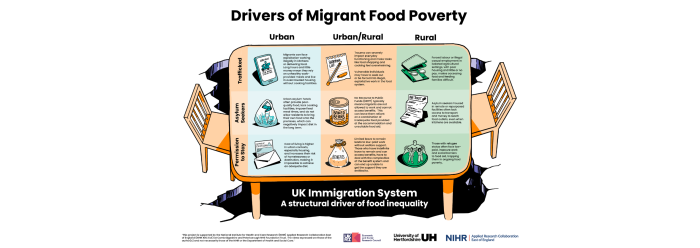Researchers from the ARC East of England have developed a free, informative resource to help professionals working with migrants to better understand the causes of food poverty among migrants and provide more effective support.

Drivers of migrant food poverty resource
Driven by global conflicts, political instability, and climate change, the number of forced migrants in the UK is the highest it has ever been and continues to rise. The choice to migrate from low to high-income countries is very difficult for individuals, and many migrants face marginalisation, poverty and exploitation upon arrival.
Research shows that migrants often end up relying on third-sector organisations, such as food banks, to supplement state support and meet their basic needs. However, ongoing cuts to public sector funding have dramatically increased pressure on charities and community organisations, impacting the support they are able to provide. Many migrants do not receive the necessary help from health and care services needed to live healthy lives, increasing their vulnerability to food poverty and poorer health outcomes.
Funded by the Economic and Social Research Council (ESRC) Impact Accelerator Award, researchers from the Universities of Hertfordshire and Oxford have developed a free, visual resource to help professionals working with migrants to better understand the causes and impact of food poverty on forced migrants in the UK.
Dr Claire Thompson, Theme Lead for ARC East of England’s Prevention and Early Detection in Health and Social Care and Principal Investigator of this study, explains the project’s background: “Collectively, our research around food poverty in recent years has increasingly featured the experiences of those who have been forced or compelled to leave their home and travel to the UK. The immigration system itself is complex and politically fraught.
“Experience of migrant food poverty are highly situated and dependent upon immigration status and where abouts in the country that people end-up being placed. It is clear that migrant food poverty and the immigration system as a driver of food poverty need to be further explored in order to inform appropriate intervention and policy.”
Dr Claire Thompson, Theme Lead for ARC East of England’s Prevention and Early Detection in Health and Social Care and Principal Investigator of this study
The resource draws on existing research and literature to highlight the main challenges forced migrants face in accessing nutritious, healthy meals, which vary by immigration status and geographical location. For example, trafficked individuals, asylum seekers, and people with permission to stay often have different experiences: some live in suburban 'asylum hotels' with no cooking facilities, while others are in rural areas with limited access to support services and no nearby shops. By identifying these barriers, this guide increases understanding of these issues and informs future research and support in this area.
The guide was reviewed by people with lived experience of seeking asylum, alongside professionals who support migrant communities, to ensure that it was representative of their real-world experiences.
The research team plans to share the guide with health and care professionals, as well as researchers working in migrant health. The team is currently writing a review of the literature to accompany the graphic, and they plan to collect data to understand the impact of this guide.
Fill out the form to download the resources here
Get in touch with the research team by emailing Dr Claire Thompson via email: c.thompson25@herts.ac.uk.
